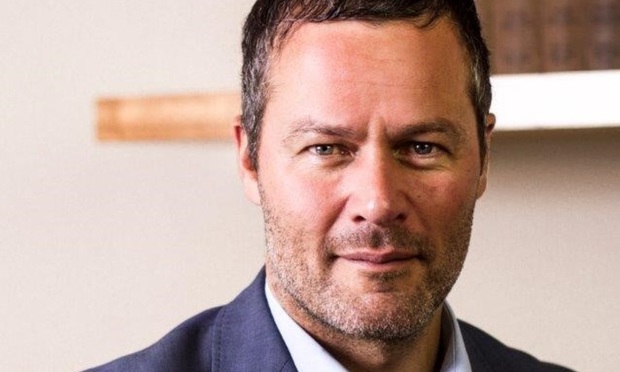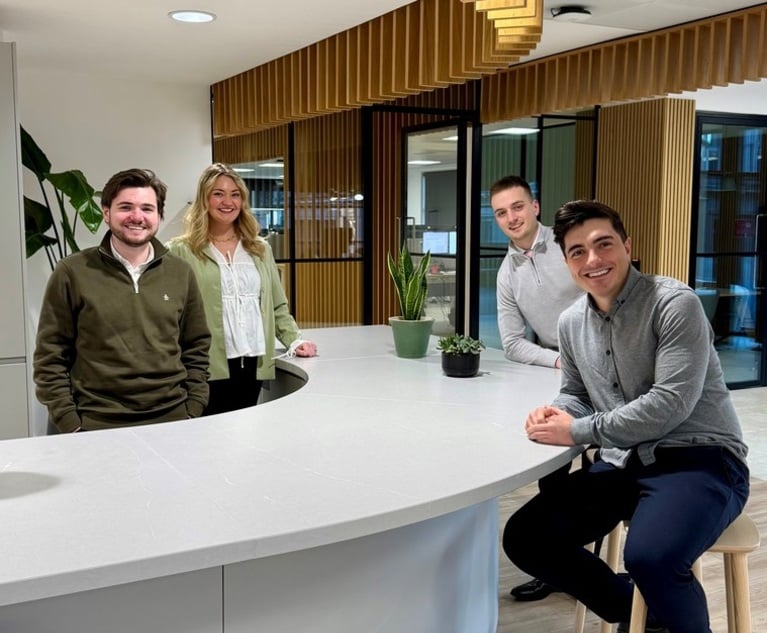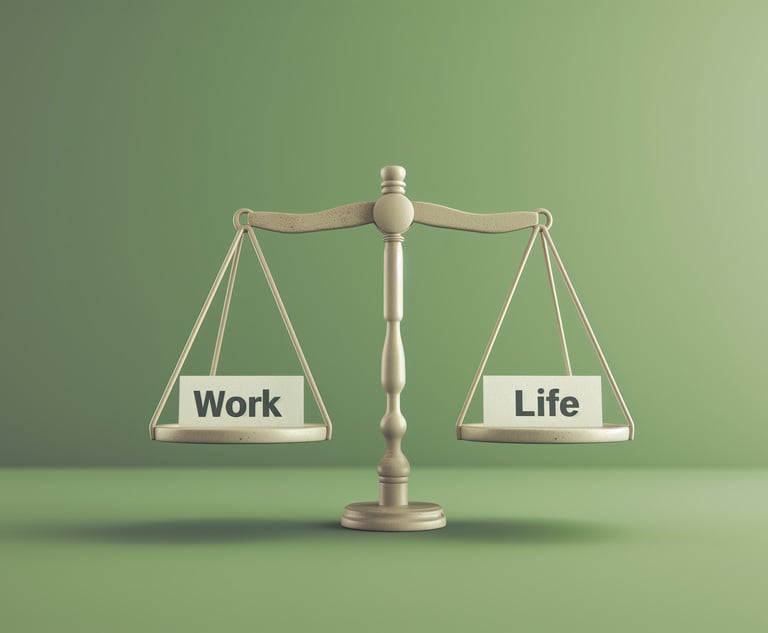'It is difficult to call out client discrimination' – one man's experiences of being gay in law
Death, drugs and discrimination: the extraordinary story of Fieldfisher regulatory head John Cassels, who overcame all odds to succeed in City law
January 24, 2019 at 02:47 AM
6 minute read
 John Cassels – Fieldfisher regulatory group co-head and Brexit taskforce lead
John Cassels – Fieldfisher regulatory group co-head and Brexit taskforce lead
"This isn't a sob story," says Fieldfisher regulatory head and Brexit taskforce chief John Cassels. But, having endured at the brink of personal catastrophe, his is not your familiar tale of City success.
Sitting down with Legal Week, he describes a life shaped by family tragedy, the struggles he encountered as a young gay man growing up in Scotland and, as a lawyer, the uneasy tension between winning business and calling out discrimination.
Coming from a family line of "dirt-poor blacksmiths and farmers" in the southern Scottish town of Kilmarnock, Cassels learnt very early on to deal with tragedy when his mother died after a six-year battle with Leukemia. He was 12.
Affected by her death, his father became "emotionally absent".
"My father was extremely homophobic as a result of his own upbringing," he said. "It made me question who I was – it kills your self-esteem."
He called it unnatural, he said I was worse than a criminal and that he never wanted to see me again
Cassels felt forced to conceal his homosexuality from his father. And school, where he was bullied regularly, provided little respite. The impossibility of living in such an environment meant that Cassels left home at 16. But he still attained good grades at school. He went on to study law at Glasgow University and despite leaving then returning sometime later, eventually graduated with a first-class honours degree.
It was at this stage he felt bold enough to visit his father and finally come out to him.
"I went to him and, the moment came. I just said it – 'dad, you know I'm gay, right'. It felt like the world had stopped."
The response was predictably hostile.
"He called it unnatural, he said I was worse than a criminal and that he never wanted to see me again."
London law, private pain
He moved to London to embark on his legal career, starting at magic circle firm Slaughter and May where he spent four years. He then joined US firm Shearman & Sterling where over three years he continued to develop his competition law specialism.
Life, it seemed, was looking up. His career was taking off. He was in a loving relationship. He wrote to his father every three months telling him he still loved him and that he wanted to see him. But tragedy was to make a pernicious return.
It was strange – working in the outwardly privileged world of the City, and returning home in the evenings to see wrapped packets of tin foil around the flat
His boyfriend at the time developed a heroin addiction. Then, 18 months into their relationship, he suddenly collapsed and died in the middle of the street.
"It was a very dark time," says Cassels. "It was strange – working in the outwardly privileged world of the City, and returning home in the evenings to see wrapped packets of tin foil around the flat. Witnessing him on drugs, in withdrawal – have you ever seen something like that?"
Cassels talks about how often it felt the pain was too great to bear.
But then, one day, after two and a half years writing to his father to no reply – he received a letter. It was his father telling him he was "really sorry", and that he "wanted to see him again".
Cassels says: "We now enjoy a close and supportive relationship. His change is testament to an openness and willingness in people to see things differently."
Calling out clients
In his career, Cassels' experience with colleagues and clients has not always been straightforward either. He laments an episode in which another lawyer made an assumption about his interests outside of work because he was gay. He feels it is necessary to call people out, whether a partner or otherwise, on homophobic behaviour, even if words are uttered in otherwise genial settings.
But when it comes to dealing with clients, he admits, the situation becomes that bit more complex, and one in which black-and-white answers are not readily available.
You're trying to build a relationship, but you don't know what their views are. There is a huge fear of rejection
He discusses the tension between calling out homophobic behaviours and the pressure to win business as a partner. He talks in particular about a nervousness he felt when clients in the past asked questions like, 'are you married?'.
"You win work by fostering relationships built on trust – and you do that by being open. But I haven't always been able to be forthcoming with some clients. You're trying to build a relationship, but you don't know what their views are. There is a huge fear of rejection."
He adds: "In some cultures and jurisdictions, the answers are rarely straightforward and it is, admittedly, difficult to call out client discrimination."
He agrees that more needs to be done in this regard, and that calling out even apparently perfunctory remarks is the only way workplace discrimination can be tackled.
The issue exists despite plenty of progress within private practice firms on LGBT issues. A number of City firms were this week included in equal rights charity Stonewall's annual top 100 list of employers, which lists the UK companies that work hardest to achieve equality for LGBT people.
But Cassels also believes his experiences have helped him in his decisions at work, and helped him to build better relationships with both his juniors and fellow partners.
"These experiences determine how you interact with people," he says. "Team meetings, for example, can become a forum for partners to gloat about their achievements. But we have a meeting each week where associates, paralegals and more senior lawyers are encouraged not to simply report on what they're working on. I encourage everyone to take their moment and to communicate with consciousness."
And all things considered, Cassels regards himself lucky, as these experiences have lent him an "external softness and an inner strength – unlike the reverse, which we see too much of in the City".
This content has been archived. It is available through our partners, LexisNexis® and Bloomberg Law.
To view this content, please continue to their sites.
Not a Lexis Subscriber?
Subscribe Now
Not a Bloomberg Law Subscriber?
Subscribe Now
NOT FOR REPRINT
© 2025 ALM Global, LLC, All Rights Reserved. Request academic re-use from www.copyright.com. All other uses, submit a request to [email protected]. For more information visit Asset & Logo Licensing.
You Might Like
View All
‘Raises More Questions Than Answers’: Partners Puzzled by Leadership Change at UK Competition Regulator


Long Hours, Lack Of Boundaries: Associates In India Are Leaving Their Firms
Trending Stories
- 1No Two Wildfires Alike: Lawyers Take Different Legal Strategies in California
- 2Poop-Themed Dog Toy OK as Parody, but Still Tarnished Jack Daniel’s Brand, Court Says
- 3Meet the New President of NY's Association of Trial Court Jurists
- 4Lawyers' Phones Are Ringing: What Should Employers Do If ICE Raids Their Business?
- 5Freshfields Hires Ex-SEC Corporate Finance Director in Silicon Valley
Who Got The Work
J. Brugh Lower of Gibbons has entered an appearance for industrial equipment supplier Devco Corporation in a pending trademark infringement lawsuit. The suit, accusing the defendant of selling knock-off Graco products, was filed Dec. 18 in New Jersey District Court by Rivkin Radler on behalf of Graco Inc. and Graco Minnesota. The case, assigned to U.S. District Judge Zahid N. Quraishi, is 3:24-cv-11294, Graco Inc. et al v. Devco Corporation.
Who Got The Work
Rebecca Maller-Stein and Kent A. Yalowitz of Arnold & Porter Kaye Scholer have entered their appearances for Hanaco Venture Capital and its executives, Lior Prosor and David Frankel, in a pending securities lawsuit. The action, filed on Dec. 24 in New York Southern District Court by Zell, Aron & Co. on behalf of Goldeneye Advisors, accuses the defendants of negligently and fraudulently managing the plaintiff's $1 million investment. The case, assigned to U.S. District Judge Vernon S. Broderick, is 1:24-cv-09918, Goldeneye Advisors, LLC v. Hanaco Venture Capital, Ltd. et al.
Who Got The Work
Attorneys from A&O Shearman has stepped in as defense counsel for Toronto-Dominion Bank and other defendants in a pending securities class action. The suit, filed Dec. 11 in New York Southern District Court by Bleichmar Fonti & Auld, accuses the defendants of concealing the bank's 'pervasive' deficiencies in regards to its compliance with the Bank Secrecy Act and the quality of its anti-money laundering controls. The case, assigned to U.S. District Judge Arun Subramanian, is 1:24-cv-09445, Gonzalez v. The Toronto-Dominion Bank et al.
Who Got The Work
Crown Castle International, a Pennsylvania company providing shared communications infrastructure, has turned to Luke D. Wolf of Gordon Rees Scully Mansukhani to fend off a pending breach-of-contract lawsuit. The court action, filed Nov. 25 in Michigan Eastern District Court by Hooper Hathaway PC on behalf of The Town Residences LLC, accuses Crown Castle of failing to transfer approximately $30,000 in utility payments from T-Mobile in breach of a roof-top lease and assignment agreement. The case, assigned to U.S. District Judge Susan K. Declercq, is 2:24-cv-13131, The Town Residences LLC v. T-Mobile US, Inc. et al.
Who Got The Work
Wilfred P. Coronato and Daniel M. Schwartz of McCarter & English have stepped in as defense counsel to Electrolux Home Products Inc. in a pending product liability lawsuit. The court action, filed Nov. 26 in New York Eastern District Court by Poulos Lopiccolo PC and Nagel Rice LLP on behalf of David Stern, alleges that the defendant's refrigerators’ drawers and shelving repeatedly break and fall apart within months after purchase. The case, assigned to U.S. District Judge Joan M. Azrack, is 2:24-cv-08204, Stern v. Electrolux Home Products, Inc.
Featured Firms
Law Offices of Gary Martin Hays & Associates, P.C.
(470) 294-1674
Law Offices of Mark E. Salomone
(857) 444-6468
Smith & Hassler
(713) 739-1250









